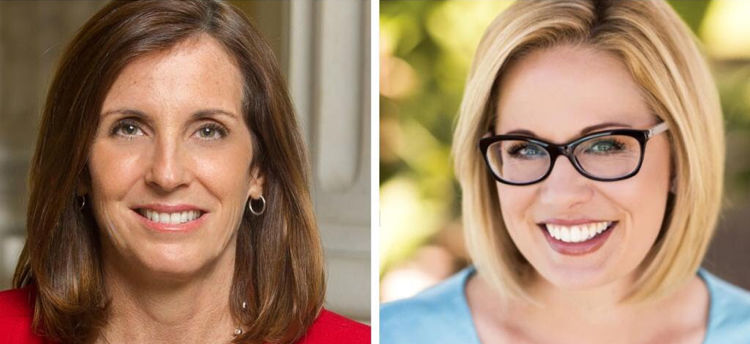PHOENIX — Two Arizona congresswomen on Tuesday wrap up their race for a vacant U.S. Senate seat in one of the costliest and heated contests in the nation.
Republican Rep. Martha McSally and Democratic Rep. Kyrsten Sinema are both champion fundraisers and skilled politicians who have repeatedly won in tough swing districts.
The avid triatheletes are battling over the seat vacated by Sen. Jeff Flake, a Republican who decided not to run for re-election because he realized his criticism of President Trump made it impossible for him to keep the seat.
The Senate election is the top race in Arizona, where voters will also choose between incumbent Republican Gov. Doug Ducey and his Democrat education professor challenger, David Garcia. A Republican-backed ballot measure asks voters to expand the state's voucher system and a Democrat-backed one seeks to boost renewable energy use.
McSally and Sinema have both remade themselves politically. McSally, 52, is a onetime Trump critic who has embraced the president since his election. She has tried to rally Republican voters by emphasizing her military background as the first U.S. female combat pilot while touting her support for the president's tax cut and other parts of his agenda.
Sinema, 42, is a former Green Party activist who became a Democratic centrist with her first election into the House of Representatives in 2012.
She's one of the congressional Democrats most likely to vote to back Trump's agenda but has spent the race hammering McSally for casting a vote for the health bill backed by the president. The repeal of the Affordable Care Act, which didn't become law, would have weakened protections for people with pre-existing conditions.
In response, McSally criticized Sinema over her shifting views, contending she was still a closet liberal who disrespected the military. Republican ads publicized a 2010 video of Sinema repeating a comedian's description of the state as "the meth lab of democracy."
McSally also accused Sinema of treason for an offhand comment in a 2002 radio interview with an anti-war talk show host who suggested hypothetically he might join the Taliban. Sinema had responded it would not bother her if she did so.
During her 2016 campaign to be re-elected to her Tucson area swing district House seat, McSally criticized Trump for attacking the parents of an Army captain killed in Iraq and for a videotape in which the future president bragged about sexually assaulting women.
Though she's since embraced the president, the criticism hobbled her during this year's three-way Republican primary for Senate, when her challengers attacked her as insufficiently supportive of the president.
Sinema faced no real opposition in the Democratic primary and had months to define herself as a nonpartisan, problem-solving centrist on the airwaves while her allies slammed McSally with attack ads over the Republican's health care vote.
The candidates and their allies spent more than $90 million in a race that could determine which party controls the U.S. Senate. Also at stake is Arizona's role in national elections. Republicans have won every statewide race since 2006 but Democrats have repeatedly hoped the state's growing Latino population and influx of more educated professionals would make it competitive.
The Senate race will test that theory and may help determine whether Democrats target Arizona in the 2020 presidential election.





